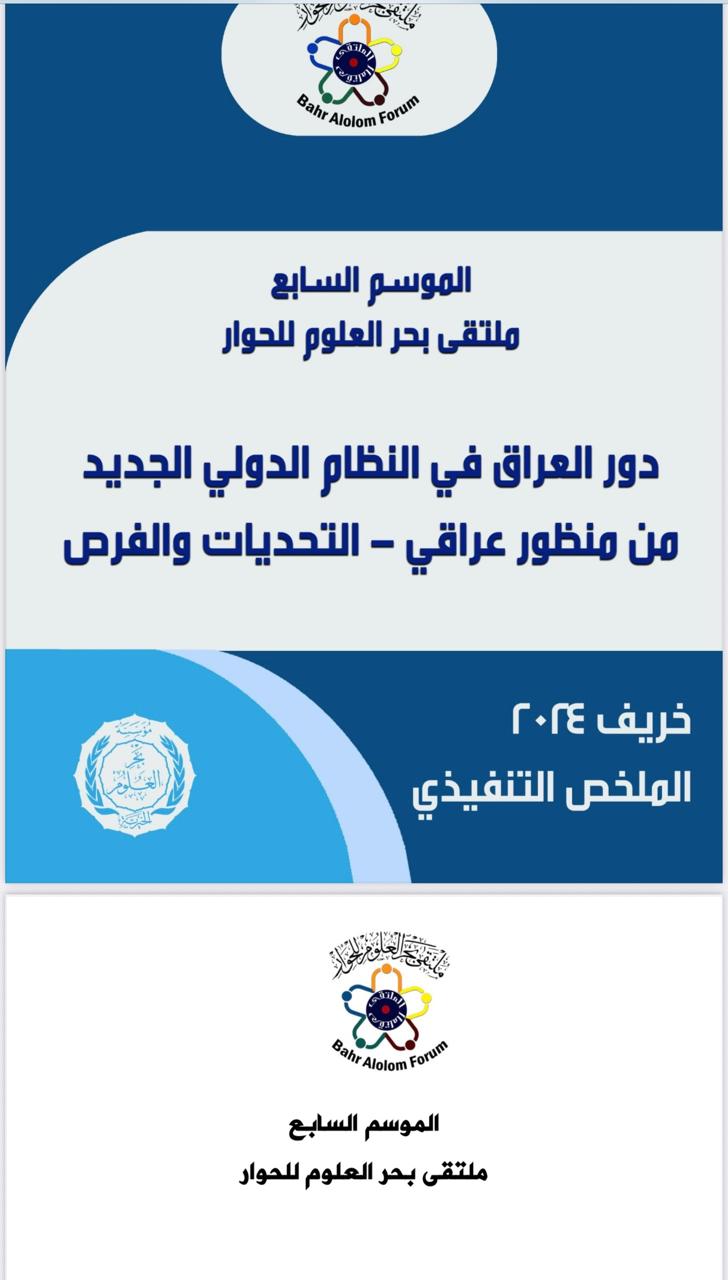The Bahr Al-Uloom Dialogue Forum announces the executive summary for its seventh season, Fall 2024.

The Bahr Al-Uloom Dialogue Forum announces the executive summary for its seventh season, Fall 2024.
The Bahr Al-Uloom Dialogue Forum issued the executive summary of its seventh season, Fall 2024, which was held under the title "Iraq's Role in the New International Order from an Iraqi Perspective - Challenges and Opportunities."
The seventh season featured five thought-provoking roundtable discussions featuring Iraqi politicians and experts, discussing Iraq's position in global transformations and the importance of being an active participant, not a passive recipient. The seminars explored the extent to which Iraq possesses a clear strategic vision and ways to strengthen its regional and international standing.
The lectures and main panels during the seventh season included a lecture by Sayyid Mohsen al-Hakim, in which he called for an independent Iraqi-Islamic civilizational project and emphasized that Iraq possesses elements of strength contingent on internal reform. Dr. Nawfal Abu al-Shon's lecture addressed the transformations toward a multipolar world order and called for the adoption of a productive foreign policy and the use of soft diplomacy. Dr. Abbas Kazim indicated in his lecture that Iraq is not on the margins, but rather at the heart of these transformations and requires a comprehensive national project. Dr. Taleb al-Hamdani's lecture discussed relations with Washington and Tehran, and the lecturer called for a policy of positive neutrality based on interests rather than dependency. The roundtable with the Finnish CMI organization examined Iraq's role in regional mediation, water diplomacy, and climate change, emphasizing the importance of water policy and multi-track diplomacy.
The seminars concluded that there were a number of problems, including the absence of a strategic vision for foreign policy, fragmented political decision-making, excessive reliance on a rentier economy based on oil revenues, and the connection of some internal forces to external axes.
The seventh season of the Bahr Al-Uloom Dialogue Forum proposed paths based on rebuilding Iraq's strategic vision, developing the concept of "national interest," shifting to a proactive rather than reactive foreign policy, strengthening Iraq's regional standing, unifying political decision-making, building effective and productive diplomatic institutions and research centers, achieving balance in Iraq's international relations, adopting "multiple partnerships," engaging in multiple systems, activating soft power, harnessing cultural and religious diversity, and supporting civil society, media, and education.
The seventh season of the Bahr al-Ulum Dialogue Forum recommended the preparation of a national foreign policy document, the restructuring of the Ministry of Foreign Affairs, the launch of the "Iraq Mediator" program, linking foreign policy to development, and ensuring a unified political and media discourse.
The forum concluded that Iraq has a historic opportunity to become an active player in the international system, provided it has a unified strategic vision, leverages soft power and mediation tools, and rebuilds trust internally and externally.

